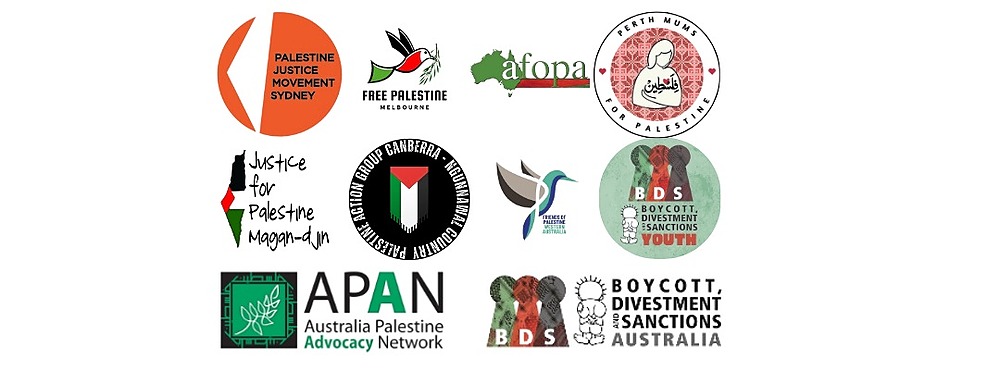Boycott, Divestment and Sanctions: Military, economic and legal impacts on Apartheid Israel
Event description
Boycott Divestment and Sanctions: Military, economic and legal impacts on Apartheid Israel
A conversation with subject matter experts
A webinar highlighting international efforts towards combating Apartheid Israel within the context of the current crisis in Gaza and Palestine as a whole
We acknowledge the traditional owners on whose unceded lands this event will take place. This always was, always will be Aboriginal Land. We acknowledge elders past, present and emerging and recognise and respect their continued connection and care for this sacred land through their culture and customs.
As the genocide in Gaza intensifies claiming tens of thousands of Palestinian lives, and as the resistance movement spreads further into the Occupied West Bank, Apartheid Israel finds itself under an unprecedented military, economic and political pressure from certain parts of the international community. A lot of that pressure is evidently initiated by the international civil society in the form of Boycotts.
Boycott, Divestment and Sanctions (BDS) is a Palestinian civil society-led movement that aims to provide practical tools to combat the crime of Apartheid and promote international law obligations such as those under the Genocide Convention and the Rome Statute. Established in 2005, BDS movement uses nonviolent means to leverage pressure on the State of Israel.
Indeed, the movement has three primary demands: ‘to end the occupation of all Arab lands and dismantle the wall; recognise the rights of Arab-Palestinian citizens of Israel; and respect the rights of Palestinian refugees to return to their homes, per United Nations (‘UN’) Resolution 194.’
Drawing inspiration from the anti-apartheid movement in South Africa, BDS employs boycotts, institutional divestment and government sanctions to target entities that are perceived as being complicit in Israel's violations of Palestinian rights.
BDS obligations reflect actions that may be required to effectively prevent or punish genocide under the Genocide Convention, and avoid criminal liability for being an accessory to crimes under the Rome Statute.
The International Court of Justice (ICJ) and International Criminal Courts (ICC) have issued a number of legal proceedings over the past months pertaining to Apartheid Israel's recurring violations of international law and the plausibility of committing a genocide in Gaza, most recent of which is the ICJ ruling that Israel’s continued presence in the occupied Palestinian territory is unlawful and should come to an end “as rapidly as possible”.
It is now left to ICJ member states to enforce those rulings. And this is where BDS can be instrumental, where calls for imposing sanctions and arms embargo on Apartheid Israel by many international human rights and civil society organisations worldwide are at an unpresented height.
This webinar will feature a panel discussion with subject matter experts to discuss very important questions which have been consistently left out of the mainstream discourse, especially in the Australian media, including:
- How significant is the impact of BDS on achieving justice and freedom for Palestinians? What is the trajectory of such an impact into the future?
- How effective are sanctions campaigns and calls for arms embargoes in combating Apartheid Israel? How did the the genocide in Gaza impact the BDS movement?
- In light of the ongoing ICJ and ICC legal proceedings, can BDS be viewed as means to enforce international legal obligations? What is the Australian legal context?
To answer these questions and more, please join us with Rawan Arraf, Shir Hever and Shahd Hammouri in a wide ranging discussion of the role of the BDS movement in combating Apartheid Israel and as a legal tool to promote justice, freedom and equality for Palestinians.
Rawan Arraf is a lawyer and the founder and Executive Director of the Australian Centre for International Justice (ACIJ), Australia’s first international justice legal centre.
Dr. Shir Hever is the coordinator of the military embargo campaign for the BNC (Boycott National Committee) of the Boycott, Divestment and Sanctions movement.
Dr. Shahd Hammouri is a lecturer in international law at the university of Kent. She is a legal consultant for multiple Palestinian civil society organisations and the author of the forthcoming book: Corporate War Profiteering and International law.
The discussion is held online via Zoom. The link will be emailed closer to the date of the webinar.
Please book your spot in advance and make sure you enter an accurate email address.
This event is hosted by Palestine Justice Movement Sydney and Free Palestine Melbourne, in collaboration with Tasmanian Palestine Advocacy Network, Australian Friends of Palestine Association, Palestine Action Group Canberra, and Justice for Palestine Magan-djin.
The webinar will be broadcasted nation-wide and will be recorded and published on the hosting organisations' online platforms for future views.

Tickets for good, not greed Humanitix dedicates 100% of profits from booking fees to charity


